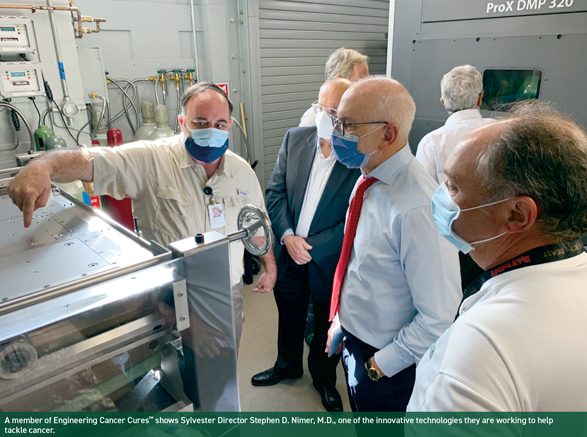Collaborative partnership will integrate cancer biology, clinical outcomes, and new pathways discovered with engineered therapeutics and diagnostics to advance cancer cures.
Researchers at Sylvester Comprehensive Cancer Center at the University of Miami Miller School of Medicine have joined forces with the University of Miami College of Engineering for Engineering Cancer Cures™, to develop and deploy innovative technologies for early detection, diagnosis, and treatment of cancer.
Sylvester Director Stephen D. Nimer, M.D., who is also the executive dean for research at the Miller School and holder of the Oscar de la Renta Endowed Chair in Cancer Research joined forces with Dean of Engineering Pratim Biswas, Ph.D., to co-create Engineering Cancer Cures. Shanta Dhar, Ph.D., assistant director for technology and innovation at Sylvester, and Ashutosh Agarwal, Ph.D., associate professor of biomedical engineering are co-leading the partnership.
Engineering Cancer Cures aims to integrate cancer biology, clinical outcomes, and new pathways discovered with engineered therapeutics and diagnostics to advance cancer cures, according to Dr. Dhar.
While cancer clinicians know what cancer patients need, engineers help to fulfill those needs by designing innovative therapies, procedures algorithms, and more, according to Dr. Agarwal, who is associate director of UM’s Biomedical Nanotechnology Institute and a Sylvester member.
Engineering Cancer Cures includes three working groups — Intelligent Materials and Targeting, Cancer Tissue Engineering, and Artificial Intelligence/Machine Learning/Deep Learning-Based Imaging and Analytics. Initial research projects include looking at how to better reach tumor targets, therapeutic cell engineering, artificial intelligence (AI) in cancer imaging and many others.
Dr. Agarwal, who is co-leading the initiative’s Cancer Tissue Engineering working group with Jashodeep Datta, M.D., assistant professor of gastrointestinal surgical oncology, said they will focus on such things as the possible transition from classic therapies that can be taken or infused, such as chemotherapies, to treatment that involves placement of living tissue or cells in cancer patients.
Engineering Cancer Cures will accelerate collaborative discoveries otherwise siloed in the cancer biology and engineering disciplines, according to Dr. Datta.
From their research, large datasets will help identify predictive models to refine care and the use of drug therapies for diverse patients such as those who are Black or Hispanic.
In the Artificial Intelligence/Machine Learning/Deep Learning-Based Imaging and Analytics working group, a team of clinicians and mathematicians are integrating and analyzing large datasets from genomic sequencing, tissue pathology, and radiologic tissue imaging.

“Here at Sylvester and at the University of Miami medical system, we are generating a lot of data in research and patient care,” said Stephan Schürer, Ph.D., a professor of pharmacology at the Miller School, who is co-leading the group with Mohamed Abdel-Mottaleb, Ph.D., professor and chair of the Department of Electrical and Computer Engineering. “It is critically important to be able to use the data to develop predictive models.”
The collaboration with engineering will result in infrastructures that allow optimal use of the data and development of novel solutions for patients and the health system, according to Dr. Schürer, who leads the Cancer Science Initiative and is director of digital drug discovery at UM’s Institute for Data Science and Computing.
While other respected U.S. cancer centers encourage collaboration between cancer center and engineering scientists, Sylvester stands out for its access to a diverse local population of cancer patients, according to Dr. Agarwal.
“This gives us a strategic advantage because we know that drugs and therapies approved in studies with predominately White patients might not work in Black or Hispanic patients, for example. It is very important to capture those racial differences,” Dr. Agarwal said.